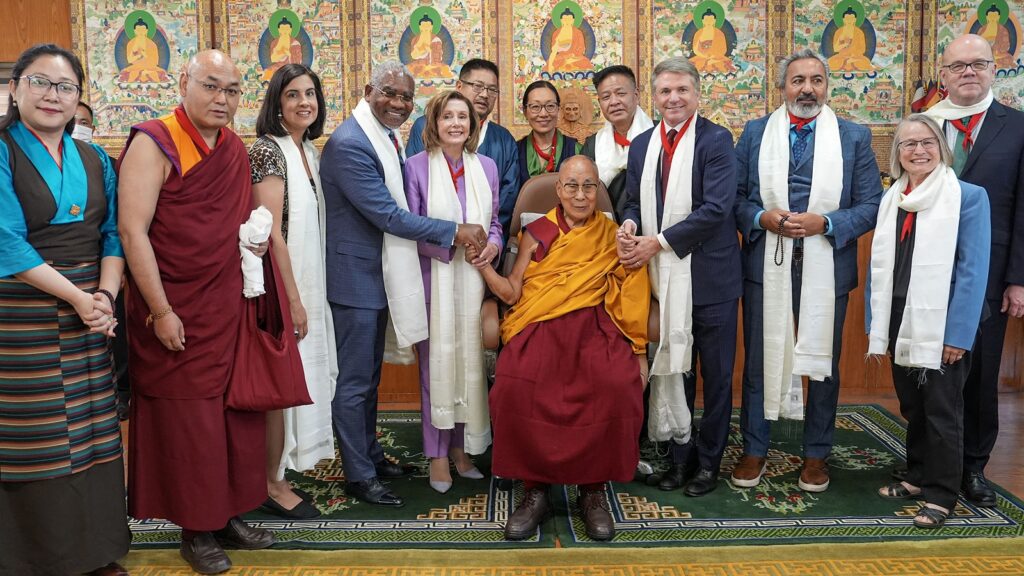
- Pelosi’s words are a direct attack on Xi Jinping’s leadership highlighting that the US was ready to back Tibetan freedom and rights.
- China has warned the US against endorsing the “Resolve Tibet Act,” and threatened countermeasures if passed into law.
- While India supports the American stand on human rights and the autonomy of Tibet, it will also have to be cautious in its relations with China which can further escalate the border issues.
Chinese President Xi Jinping’s unexpected visit to Tibet has become the focal topic of discussion, particularly as the military standoff between India and China continues in the eastern sector in Ladakh. A parallel event that occurred during the same period has raised the heat on the geopolitics of the region. The visit of Speaker of the US House of Representatives Nancy Pelosi and other senior US officials to the provincial Tibetan capital Dharamshala and the meeting with the Tibetan spiritual leader, the Dalai Lama has led to more verbal ratcheting and heated diplomatic exchanges.
Pelosi’s Stern Warning to Xi Jinping
To begin with, Pelosi is giving a direct and strong message to Xi Jinping in a provocative manner. While visiting Dharamshala she conveyed the timeless sayings of the Dalai Lama on knowledge, tradition, compassion, purity of the soul and love. While it may be premature to draw direct parallels, she also made a clear threat to Xi Jinping, saying, “You have no future and nobody will say you did anything.” Pelosi’s words contrasted authoritarian temporality with the immortality of spirit and conscience. This direct attack on Xi Jinping’s leadership highlighted that the US was ready to back Tibetan freedom and rights.
Meeting With The Dalai Lama Leaves US Lawmakers Baffled
Current U.S. Speaker of the House, Nancy Pelosi, and Republican primary candidate for US House of Representative Michael T. McCaul had a meeting with the Dalai Lama in Dharamshala. It followed the “Resolve Tibet Act” just recently approved by the U. S. Congress which calls for discussions between the Dalai Lama of Tibet and Chinese leaders in pursuit of a non-violent solution to the Tibet crisis. The delegation’s visit proved that the international community stands behind the Tibetan people and highlighted the U. S.’s dedication to human rights and cultural freedom in Tibet.
Sikyong Penpa Tsering’s Gesture
As part of a symbolic gesture during the public reception accorded to Congressman Michael McCaul and the rest of the U. S. bipartisan congressional delegation in Dharamshala on June 19, 2024, Sikyong Penpa Tsering handed them samples of old Tibetan paper currency of the time when Tibet was independent. This symbolic action emphasized the historical and cultural value of the struggle for Tibetan self-rule and the bond between the Tibetan leaders and their people.
China’s Reaction
As expected, China reacted vigorously to the remarks and visit. China regards the Dalai Lama as a threat and does not allow any country to encourage Tibetan separatism. China’s government warned the US against endorsing the “Resolve Tibet Act,” and threatened countermeasures if passed into law. This reaction can be attributed to China’s notorious intolerance to interference in its internal affairs especially on issues to do with Tibet.
Structural Problems in Sino-India Relations
In these diplomatic actions, U. S. Deputy Secretary of State Kurt Campbell acknowledged India’s effort to ease border tension with China. However, he indicated the challenges that Xi Jinping faces to appear to be flexible on matters concerning sovereignty. The territorial conflict between the two largest democracies, including the long-standing LAC of 3,488 km remains a historical issue.
Implications for India
The interactions between U. S. officials and the Dalai Lama, along with Nancy Pelosi’s pointed remarks, carry significant implications for India. The discussions between the U. S. officials and the Dalai Lama and Nancy Pelosi’s direct comments have the following consequences for India:
Strategic Concerns: Pelosi’s words, as well as the U.S. delegation’s meeting with the Dalai Lama, mean that the world pays attention to the issue of Tibetan self-determination – and, thus, contributes to the international backing of India’s position regarding human rights and cultural identity in the area.
Diplomatic Balancing Act: The two powers that loom large over India are the United States and China and so India must tread carefully in terms of its interactions with each. While India supports the American stand on human rights and the autonomy of Tibet, it will also have to be cautious in its relations with China which can further escalate the border issues.
Geopolitical Dynamics: The US firm position on Tibet and diplomacy supports India in its strategic battle against China. However, it puts India in a rather precariously-positioned country as it tries to juggle diplomacy and regional security.
Human Rights Advocacy: This focus on Tibetan human rights by U.S. officials has helped keep up India’s support for the Tibetan refugees and the Dalai Lama, who are in touch with India’s democratic tradition. Still, this advocacy should be balanced with pragmatic considerations in world geopolitics to sustain stability in the region.
Nancy Pelosi’s warning to Xi Jinping and the U.S. delegation’s meeting with the Dalai Lama, show that the international spotlight has been on Tibet and the general political and politico-strategic relations between India and China. As these tensions persist, Indian diplomacy will be instrumental in preserving stability within the region while promoting human rights and heritage. It means that to proceed, there must be a way that would allow not only to chart an optimal course between strategic goals and objectives but also to act ethically.
